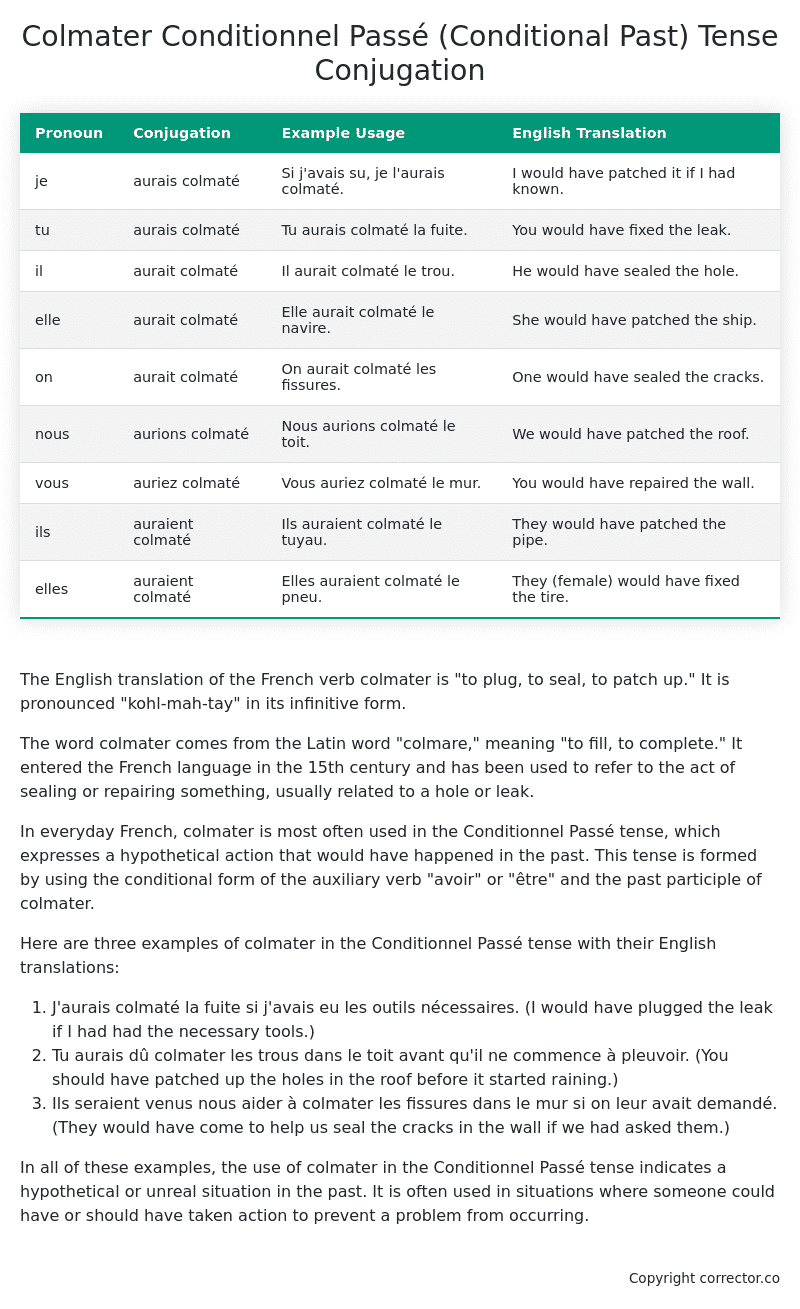Conditionnel Passé (Conditional Past) Tense Conjugation of the French Verb colmater
Introduction to the verb colmater
The English translation of the French verb colmater is “to plug, to seal, to patch up.” It is pronounced “kohl-mah-tay” in its infinitive form.
The word colmater comes from the Latin word “colmare,” meaning “to fill, to complete.” It entered the French language in the 15th century and has been used to refer to the act of sealing or repairing something, usually related to a hole or leak.
In everyday French, colmater is most often used in the Conditionnel Passé tense, which expresses a hypothetical action that would have happened in the past. This tense is formed by using the conditional form of the auxiliary verb “avoir” or “être” and the past participle of colmater.
Here are three examples of colmater in the Conditionnel Passé tense with their English translations:
- J’aurais colmaté la fuite si j’avais eu les outils nécessaires. (I would have plugged the leak if I had had the necessary tools.)
- Tu aurais dû colmater les trous dans le toit avant qu’il ne commence à pleuvoir. (You should have patched up the holes in the roof before it started raining.)
- Ils seraient venus nous aider à colmater les fissures dans le mur si on leur avait demandé. (They would have come to help us seal the cracks in the wall if we had asked them.)
In all of these examples, the use of colmater in the Conditionnel Passé tense indicates a hypothetical or unreal situation in the past. It is often used in situations where someone could have or should have taken action to prevent a problem from occurring.
Table of the Conditionnel Passé (Conditional Past) Tense Conjugation of colmater
| Pronoun | Conjugation | Example Usage | English Translation |
|---|---|---|---|
| je | aurais colmaté | Si j’avais su, je l’aurais colmaté. | I would have patched it if I had known. |
| tu | aurais colmaté | Tu aurais colmaté la fuite. | You would have fixed the leak. |
| il | aurait colmaté | Il aurait colmaté le trou. | He would have sealed the hole. |
| elle | aurait colmaté | Elle aurait colmaté le navire. | She would have patched the ship. |
| on | aurait colmaté | On aurait colmaté les fissures. | One would have sealed the cracks. |
| nous | aurions colmaté | Nous aurions colmaté le toit. | We would have patched the roof. |
| vous | auriez colmaté | Vous auriez colmaté le mur. | You would have repaired the wall. |
| ils | auraient colmaté | Ils auraient colmaté le tuyau. | They would have patched the pipe. |
| elles | auraient colmaté | Elles auraient colmaté le pneu. | They (female) would have fixed the tire. |
Other Conjugations for Colmater.
Le Present (Present Tense) Conjugation of the French Verb colmater
Imparfait (Imperfect) Tense Conjugation of the French Verb colmater
Passé Simple (Simple Past) Tense Conjugation of the French Verb colmater
Passé Composé (Present Perfect) Tense Conjugation of the French Verb colmater
Futur Simple (Simple Future) Tense Conjugation of the French Verb colmater
Futur Proche (Near Future) Tense Conjugation of the French Verb colmater
Plus-que-parfait (Pluperfect) Tense Conjugation of the French Verb colmater
Passé Antérieur (Past Anterior) Tense Conjugation of the French Verb colmater
Futur Antérieur (Future Anterior) Tense Conjugation of the French Verb colmater
Subjonctif Présent (Subjunctive Present) Tense Conjugation of the French Verb colmater
Subjonctif Passé (Subjunctive Past) Tense Conjugation of the French Verb colmater
Subjonctif Imparfait (Subjunctive Imperfect) Tense Conjugation of the French Verb colmater
Subjonctif Plus-que-parfait (Subjunctive Pluperfect) Tense Conjugation of the French Verb colmater
Conditionnel Présent (Conditional Present) Tense Conjugation of the French Verb colmater
Conditionnel Passé (Conditional Past) Tense Conjugation of the French Verb colmater (this article)
L’impératif Présent (Imperative Present) Tense Conjugation of the French Verb colmater
L’infinitif Présent (Infinitive Present) Tense Conjugation of the French Verb colmater
Struggling with French verbs or the language in general? Why not use our free French Grammar Checker – no registration required!
Get a FREE Download Study Sheet of this Conjugation 🔥
Simply right click the image below, click “save image” and get your free reference for the colmater Conditionnel Passé tense conjugation!

Colmater – About the French Conditionnel Passé (Conditional Past) Tense
Formation
Common Everyday Usage Patterns
Expressing Unreal Past Scenarios
Polite Requests or Suggestions
Expressing Doubt or Uncertainty
Interactions with Other Tenses
Conditional Present
Indicative Past Tenses
Conditional Future
Summary
Want More?
I hope you enjoyed this article on the verb colmater. Still in a learning mood? Check out another TOTALLY random French verb conjugation!


